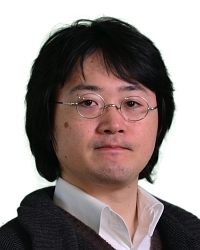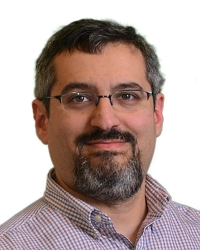TR2019-140
Deep Learning for Synchronization and Channel Estimation in NB-IoT Random Access Channel
-
- , "Deep Learning for Synchronization and Channel Estimation in NB-IoT Random Access Channel", IEEE Global Communications Conference (GLOBECOM), DOI: 10.1109/GLOBECOM38437.2019.9013510, December 2019.BibTeX TR2019-140 PDF
- @inproceedings{Jespersen2019dec,
- author = {Jespersen, Mads Helge and Pajovic, Milutin and Koike-Akino, Toshiaki and Wang, Ye and Popovski, Petar and Orlik, Philip V.},
- title = {{Deep Learning for Synchronization and Channel Estimation in NB-IoT Random Access Channel}},
- booktitle = {IEEE Global Communications Conference (GLOBECOM)},
- year = 2019,
- month = dec,
- publisher = {IEEE},
- doi = {10.1109/GLOBECOM38437.2019.9013510},
- issn = {2576-6813},
- isbn = {978-1-7281-0962-6},
- url = {https://www.merl.com/publications/TR2019-140}
- }
- , "Deep Learning for Synchronization and Channel Estimation in NB-IoT Random Access Channel", IEEE Global Communications Conference (GLOBECOM), DOI: 10.1109/GLOBECOM38437.2019.9013510, December 2019.
-
MERL Contacts:
-
Research Areas:
Artificial Intelligence, Communications, Machine Learning, Signal Processing
Abstract:
The central challenge in supporting massive IoT connectivity is the uncoordinated, random access by sporadically active devices. The random access protocol and activity detection have been widely studied, while the auxiliary procedures, such as synchronization, channel estimation and equalization, have received much less attention. However, once the protocol is fixed, the access performance can only be improved by a more effective receiver, through more accurate execution of the auxiliary procedures. This motivates the pursuit of joint synchronization and channel estimation, rather than the traditional approach of handling them separately. The prohibitive complexity of the conventional analytical solutions leads us to employ the tools of deep learning in this paper. Specifically, the proposed method is applied to the random access protocol of Narrowband IoT (NB-IoT), preserving its standard preamble structure. We obtain excellent performance in estimating Time-of-Arrival (ToA), Carrier-Frequency Offset (CFO), channel gain and collision multiplicity from a received mixture of transmissions. The proposed estimator achieves a ToA Root-Mean-Square Error (RMSE) of 0.99 microsecond and a CFO RMSE of 1.61 Hz at 10 dB Signal-to-Noise Ratio (SNR), whereas a conventional estimator using two cascaded stages have RMSEs of 15.85 microsecond and 8.05 Hz,respectively.
Related News & Events
-
NEWS MERL Scientists Presenting 11 Papers at IEEE Global Communications Conference (GLOBECOM) 2019 Date: December 9, 2019 - December 13, 2019
Where: Waikoloa, Hawaii, USA
MERL Contacts: Jianlin Guo; Toshiaki Koike-Akino; Philip V. Orlik; Pu (Perry) Wang
Research Areas: Communications, Computer Vision, Machine Learning, Signal Processing, Information SecurityBrief- MERL Signal Processing scientists and collaborators will be presenting 11 papers at the IEEE Global Communications Conference (GLOBECOM) 2019, which is being held in Waikoloa, Hawaii from December 9-13, 2019. Topics to be presented include recent advances in power amplifier, MIMO algorithms, WiFi sensing, video casting, visible light communications, user authentication, vehicular communications, secrecy, and relay systems, including sophisticated machine learning applications. A number of these papers are a result of successful collaboration between MERL and world-leading Universities including: Osaka University, University of New South Wales, Oxford University, Princeton University, South China University of Technology, Massachusetts Institute of Technology and Aalborg University.
GLOBECOM is one of the IEEE Communications Society’s two flagship conferences dedicated to driving innovation in nearly every aspect of communications. Each year, more than 3000 scientific researchers and their management submit proposals for program sessions to be held at the annual conference. Themed “Revolutionizing Communications,” GLOBECOM2019 will feature a comprehensive high-quality technical program including 13 symposia and a variety of tutorials and workshops to share visions and ideas, obtain updates on latest technologies and expand professional and social networking.
- MERL Signal Processing scientists and collaborators will be presenting 11 papers at the IEEE Global Communications Conference (GLOBECOM) 2019, which is being held in Waikoloa, Hawaii from December 9-13, 2019. Topics to be presented include recent advances in power amplifier, MIMO algorithms, WiFi sensing, video casting, visible light communications, user authentication, vehicular communications, secrecy, and relay systems, including sophisticated machine learning applications. A number of these papers are a result of successful collaboration between MERL and world-leading Universities including: Osaka University, University of New South Wales, Oxford University, Princeton University, South China University of Technology, Massachusetts Institute of Technology and Aalborg University.


